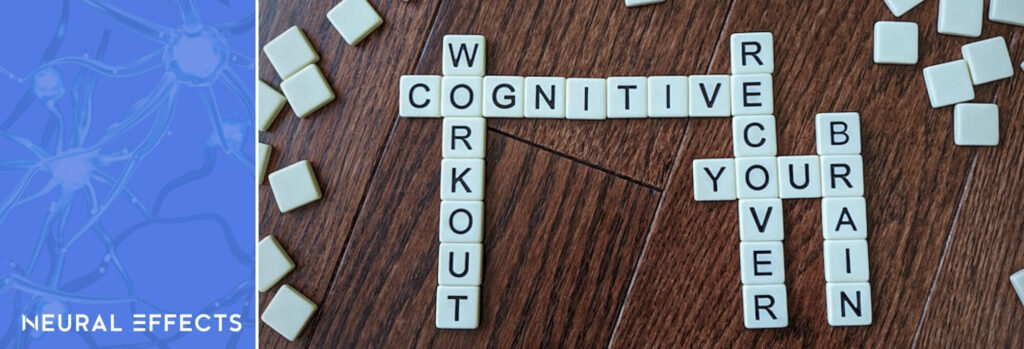Cognitive stimulation therapy (CST) is one of the best ways to help dementia patients protect their cognitive function and improve their quality of life. CST deploys a variety of games and activities designed to stimulate the patient’s cognitive function and slow down cognitive decline. It’s effective against decline from Alzheimer’s disease, Lewy body dementia, vascular dementia, and more.
Ideally, patients need to engage in a variety of activities to “train” different cognitive skills. Although there is a strong overlap in the brain when it comes to these cognitive skills, there is no evidence that training one skill can help with other skills. In practical terms, this means that playing memory games will improve memory, but won’t automatically improve attention, decision-making, and other cognitive skills.
In this article, we list some of the cognitive stimulation activities we use with our dementia patients at Neural Effects and suggest a few more to do at home. These suggestions cover a variety of cognitive skills: attention, memory, communication, processing speed, reasoning, decision-making, and mathematics.
These exercises are ideal for patients who either want to supplement an existing CST course or who would like to attend sessions but are struggling to find classes available in their area. Most of these suggestions need little or no equipment and can easily be done at home.
Table of Contents
- How CST helps dementia patients
- What CST involves at Neural Effects’ Memory and Brain Health Clinic
- CST activities you can do at home, including
Neural Effects uses the latest evidence-based techniques to diagnose and help dementia patients. We are located in Provo, Utah and serve anyone in the Salt Lake City or Utah County area. We are in network for most types of medical insurance. Schedule your evaluation today.
How Cognitive Stimulation Therapy (CST) Can Help Dementia Patients
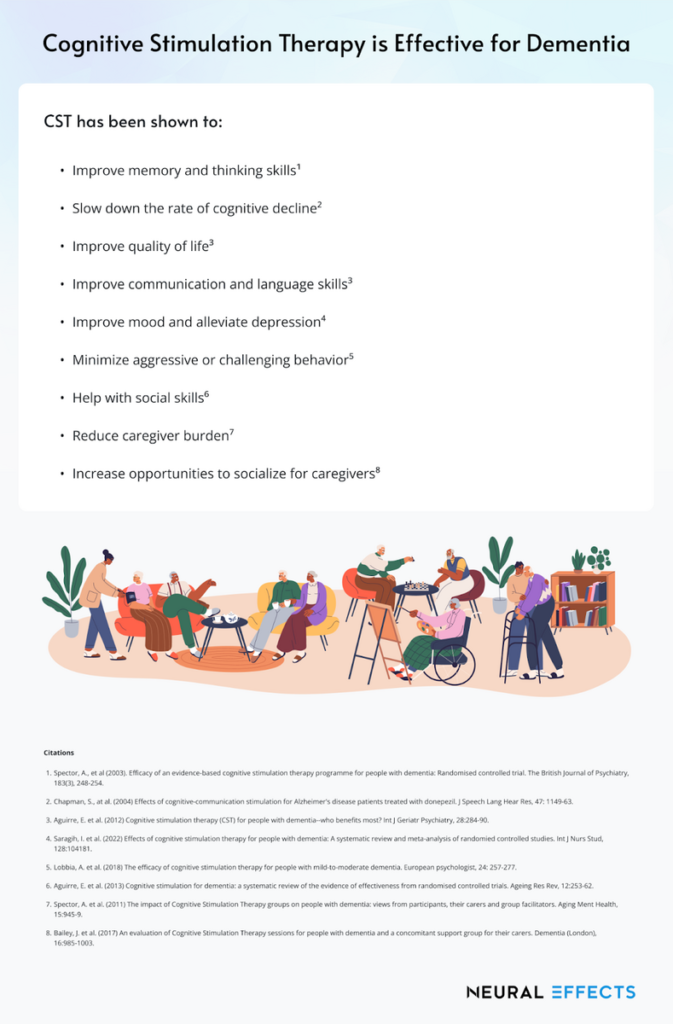
Cognitive stimulation therapy (CST) involves a wide range of activities designed to protect cognitive skills in dementia patients. Activities may include discussing past and present events, word games, puzzles, music, and practical activities, such as baking or gardening.
Multiple studies show that dementia patients who engage in this type of therapy show better performance across all cognitive areas, including memory, thinking, reasoning, attention, problem-solving, and others, compared to those who never attend CST sessions.
We’ve written more in another post about cognitive stimulation therapy and how it can benefit dementia patients.
Overall, cognitive stimulation activities provide the dementia patient with:
- A sense of purpose and focus
- A way to improve skills
- A way to build self-esteem and confidence
- Opportunities for social time with family and friends
- Opportunities to decide between multiple options
- Opportunities to share experiences with others
- Opportunities to improve cognitive skills
It’s important to know how to choose the right activity and level of difficulty for each patient. If something is too easy, patients can get bored; if it’s too difficult, it can lead to frustration, and the patient may feel demoralized. The aim is to find activities that are just challenging enough to be cognitively stimulating but not stressful. As the disease progresses and the patient’s cognitive health deteriorates, caregivers need to adapt the activities and level of support offered.
In addition, the patient should be encouraged to take an active role in choosing and defining activities they would like to do. It’s always good if the activities can include the whole family, such as when playing a board game or discussing the latest news during meal time.
Note: Many of the CST activities relevant for dementia patients can be helpful for those with signs of mild cognitive impairment. Adjust the difficulty level accordingly.
Cognitive Stimulation Therapy Activities at Neural Effects

At Neural Effects, cognitive stimulation therapy (CST) is delivered by two facilitators to a small group (6 to 8 patients). Sessions last for around 60 minutes twice a week for a total of 14 sessions. The sessions are intended for patients with mild to moderate dementia. They are designed to be fun and relaxing, creating opportunities for patients to learn new skills, express their views, and interact with others.
At Neural Effects, we supplement CST with short sessions of aerobic exercise, typically done on a stationary bike or treadmill. Research indicates that these exercise sessions benefit the patient. Physical exercise improves blood flow to the brain and triggers the release of a chemical in the brain called brain-derived neurotrophic factor (BDNF), which in turn stimulates learning and memory. Physical activity makes CST even more effective than it otherwise would be!
Treatment at our facilities starts with a neuropsychological exam (also called a neurocognitive evaluation), which takes around 2–2.5 hours to complete. During this exam, our therapists assess:
- Cognitive skills, such as problem-solving, memory, and thinking
- Physical abilities, such as balance and reflexes
- Emotional well-being, with special attention on signs of stress, anxiety, and depression
After the evaluation, our team combines this information into a cognitive care plan (CCP). The CCP is a dementia care plan that includes the main results from the assessment and how we believe the disease is likely to progress for the patient. We also suggest lifestyle changes that may help the patient, ways for the family to get involved, and recommended treatment options. If we believe the patient needs care from specialists we don’t have in-house (such as mental health counseling), we will make appropriate referrals.
Patients who qualify for our program can then start their CST sessions. Each session has a different theme, and patients engage in various activities, such as discussing world affairs, playing board games, listening to music, or doing arts and crafts.
Some examples of the cognitive activities that we do with our patients include:
Guess the….
During our CST sessions, we play multiple variations of the “guess the …” game. This can include guessing the song, the sound, the state, the scent, the object, and others. Patients write their answers on a whiteboard and then all reveal their answers at the same time.
Mad Libs
Mad Libs is a word-replacement game. From a short text, our therapists remove some of the words and leave blank spaces. Words removed can include nouns, adjectives, or verbs. Patients then have to think of words that fit in and make the sentence funny. Good sources to use for mad libs include song lyrics, recipes, and excerpts from famous TV or movie scripts.
Patients can also play at home with books and printables available from https://www.madlibs.com/.
Story dice
Patients have dice with pictures on them. Each patient gets three or four dice (or more, depending on their abilities) and then rolls the dice. With the pictures that they roll, they craft an impromptu story.
Creative activities
Patients engage in creative activities, such as painting, drawing, or playing musical instruments. This is a powerful way for patients with dementia to stimulate their minds and improve cognitive skills. It also helps them express themselves and their personalities. Creative activities allow patients to use their imagination and make them feel more connected to the world and people around them.
This activity could be adapted for home with adult coloring books, for example. These books are popular for stress relief and can be found online or in craft shops.
Trivia questions
Trivia is a fun game that we often play with our patients during CST sessions. Answering questions and learning new information helps patients retain information about topics they’re interested in and improves cognitive abilities, such as memory, reasoning, and problem-solving. Plus, playing with other patients at Neural Effects (or at home with carers, family, or friends) enhances communication skills and promotes social interactions.
Bingo
Our patients are usually familiar with bingo. This game can help with memory, thinking, orientation, and language skills and can improve social interactions when played in a group. Bingo cards can be adapted for dementia patients, including cards with fewer numbers or numbers that are in numerical order.
Current affairs
One of the main objectives of CST is to get patients to discuss themes that interest them. This may involve debating serious political affairs or simply laughing about an amusing story on the news.
Additional CST Exercises
While not all of these exercises are employed at our clinic, they are traditional options for cognitive rehabilitation with CST.
Childhood toys
Patients use dolls, cars, and other toys to reminisce about their childhood and discuss their experiences with other members of the group. Patients usually respond well to reminiscence activities because they feel confident using a skill they still have. This activity can improve cognition communication and improve the patient’s mood and quality of life.
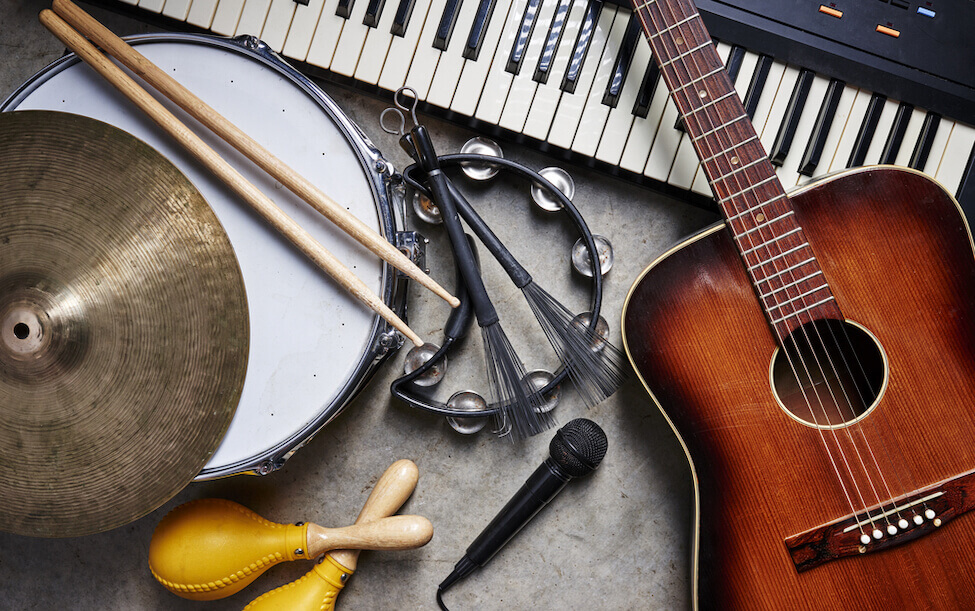
Musical instruments
Patients enjoy playing with musical instruments and creating music. Even patients who can’t play musical instruments can have fun with bongo drums or maracas and try to follow a rhythm. These activities can improve memory, attention, math skills, and reading.
Food
Studies show that cooking can improve executive function, attention, decision-making, and processing of information. Depending on the patient’s abilities, they may simply decorate cookies or help with more complex recipes.
Categorizing objects
Patients are given many different cards with photos or drawings and have to sort them into different groups. Categories can include items that are similar, opposite, color matching, vintage, modern, etc. This is easy to arrange at home or via a game called PicLink, which is designed with this use in mind.
Orientation
Patients have to follow a treasure hunt. This encourages patients to read the clues and interact with other group members to find the solution. It can be set up with minimum equipment, including written clues and a “treasure,” which can be a chocolate bar or a small present.
Money
Patients receive some coins and have to “buy” different products. This activity helps patients with decision-making when they determine what they can afford to buy and with mental math when they need to check the change after making a purchase. This is an important activity for dementia patients as studies show that the ability to perform simple math problems and handle money is typically one of the first skills to decline.
Next Steps
If, at the end of the CST sessions, our team thinks patients may benefit from further therapy, we refer them to the appropriate healthcare specialists. We encourage family members to attend the first session to find out more about CST. This way, they can repeat the activities at home with their loved ones. We also give loved ones resources about dementia and suggest support groups for the patient and their caregivers.
Neural Effects uses the latest evidence-based techniques to diagnose and help dementia patients. We are located in Provo, Utah and serve anyone in the Salt Lake City or Utah County area. We are in network for most types of medical insurance.Schedule your evaluation today.
Cognitive Stimulation Therapy Activities at Home

In addition to the activities included in CST sessions, patients can play many other games and cognitive activities at home to improve their cognitive skills. These include:
- Board and card games
- Phone apps
- Other games and activities
You can get even greater benefits by combining these CST activities with some of these physical therapy exercises for dementia patients. You can also learn more about alternative treatments in our post about dementia treatment at home.
Board and Card Games
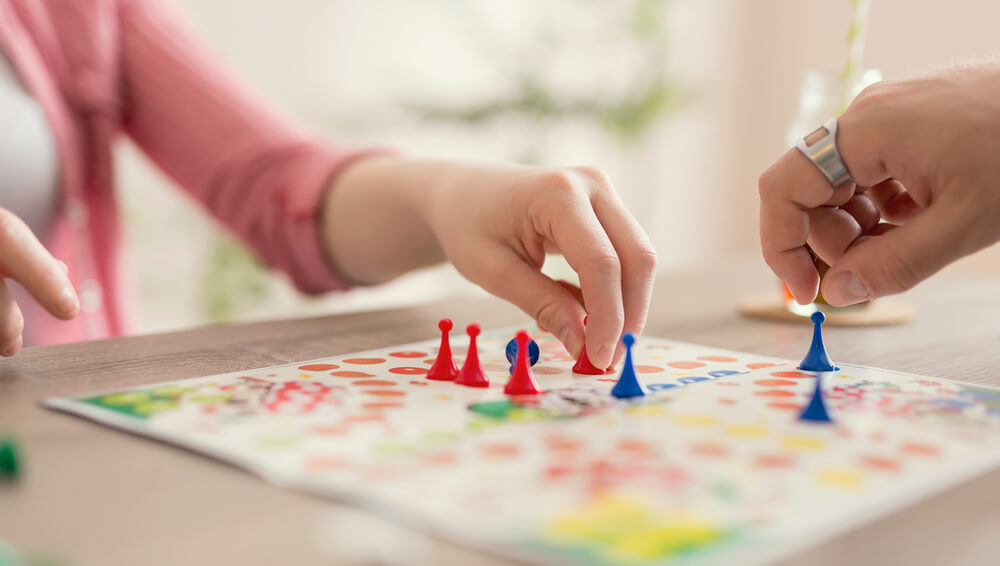
Board and card games offer multiple ways to improve cognitive skills for dementia patients. These games have been shown to improve neural communication in areas of the brain associated with logical thinking, attentional control, working memory, and problem-solving. They also promote communication skills and social interactions.
Patients can develop cognitive skills, such as thinking, concentration, problem-solving, and decision-making, by:
- Thinking ahead and planning the next move
- Predicting what others may do
- Assessing the pros and cons of different moves
- Remembering and following the rules of the game
- Exercising enough mental flexibility to play the same game differently each time
- Processing different types of information at the same time
- Organizing key facts to come up with a decision
- Developing team-working skills (for games played as a family)
- Developing collaborative strategies with other players
Many of the following games are great for a family setting or with friends in care homes:
| Pixy Cubes | Rush Hour | Hedbanz | Rummy |
| Tenzi | Super Slide | Cobra Paw | Hearts |
| Guess Who | Kanoodle | Sushi Go! | Crazy Eights |
| Scattergories | Clue | Quiddler | Skip-Bo |
| Chess | Connect Four | Spot It! | Phase 10 |
| Checkers | Codenames | Wackee Six | Apples to Apples |
| Monopoly | Sorry! | Blink | Splendor |
| Scrabble | Chutes and Ladders | Solitaire | Settlers of Catan |
| Battleship | Pictionary | Uno | Forbidden Island |
| Mastermind | Cat Lady | Go Fish |
Phone Applications
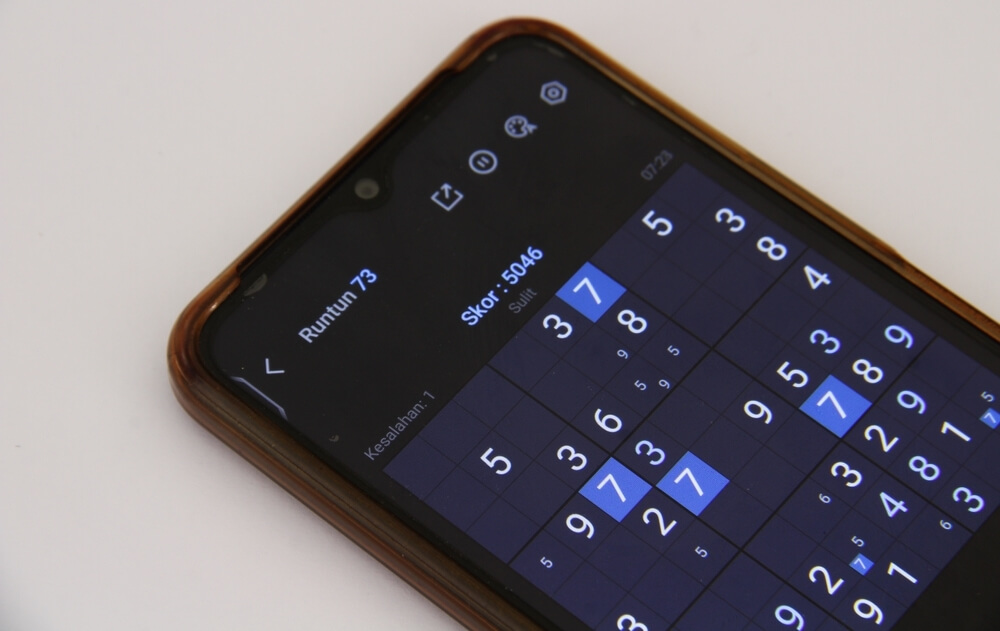
Cognitive stimulation activities are easily available through phone and tablet applications. These apps are ideal for using in the middle of daily life and often come with adjustable levels of difficulty that can be set to be suitable for each patient.
These brain training games have received much attention in the last few years. Most of them claim that spending just a few minutes a day playing can improve attention, memory, and mental agility. However, the research behind these claims is still unclear. Some studies indicate that brain training games can help improve cognitive skills in elderly patients, while others show limited benefit. The verdict is still out on whether these brain games will increase cognitive skills. If you use them regularly, just be sure to include some of the other suggestions included in this article as well.
Here are a few examples of helpful apps, including all-in-one games that claim to help cognitive function in general, as well as some games that are geared toward specific cognitive skills.
Phone Apps for Cognitive Activity
| All-in-One | Elevate $$ – free version available Lumosity $$ – free version available Peak – Brain Training $$ Brainwell: Brain Training Game $$ Fit Brains Trainer $ Mind Mate (free) CogniFit $ Clockwork Brain (free) NeuroNation |
| Executive Function | Einstein riddles (Logic Riddle) Logic Grid Puzzles Unblock My Car Wordus 15 Puzzle Mastermind 24 Math Settlers of Catan Happy Glass Hanoi tower touch Cut the Rope Number match Ball Sort Infinity loop 2048 Warlands Flip the discs |
| Attention | SET mania Triple Match 3D June’s journey: hidden objects Differences – find and spot them Closet sort – sort the goods Memory+Concentration |
| Processing Speed | Paper.io Hole.io Odd one out game Color switch Smash Hit Guitar band Avicii – gravity HD Temple run (1 or 2) Cooking craze Rush Drag N Merge Crossy Road Fruit Ninja The impossible letter game |
| Language | Wordle Word cookies Word stacks Daily Crossword Scattergories Cody cross Words with friends What’s the phrase? Bonza word puzzle Wordscapes Heads up Connections (NYT game) Spelling bee (NYT game) Vocabulary Builder by Magoosh Duolingo |
| Visual | Word search pro Cube master 3D Geoboard Slices Block! Hexa Jigsaw puzzle epic Outfolded FlowFree I love hue Unblock my car Illusion maze AMAZE |
| Memory | iSays memory game (lite) Memory match – brain training Brain game. Picture Match. Short Term Memory Memory+Concentration |
Other Games and Activities (Organized by Skill Type)
In addition to board games and apps, patients can do many games and activities at home to promote different cognitive skills.
Here, we list a few examples…
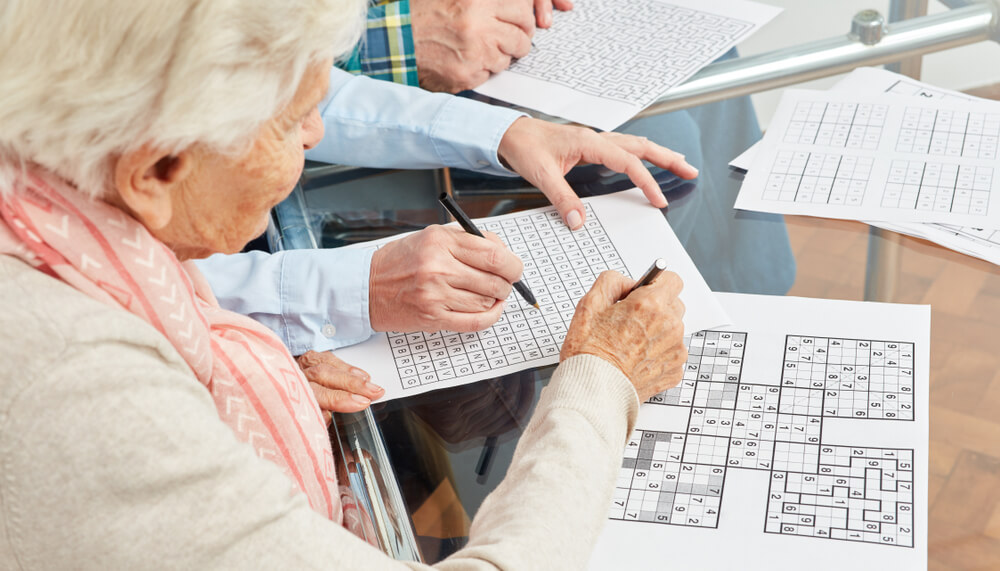
Exercises and Activities to Promote Attention
Attention refers to the ability to focus on a particular task without distraction. As a general rule, patients who can maintain their attention for long periods perform better on different cognitive challenges than those who struggle to keep focus.
- Memorize a sequence of numbers and then repeat in inverse order. As you get better, you can increase the length of the sequence.
- Look at a drawing and then try to reproduce it.
- Read a short text and then get a family member to ask you questions about it. Questions can be generic or focus on concrete details.
- Select a paragraph in any book and count the number of times a particular letter appears. This will improve your sustained attention.
Exercises and Activities to Promote Memory
In most dementia patients, memory is the first cognitive skill to start deteriorating. Here are some exercises to help patients slow down this decline:
- Look at an image, cover it, and then ask a family member to ask you questions about specific details on the image.
- Shuffle a pack of cards and place them face down on a flat surface. Pick up two cards and see if they match. If they do, remove them from the game. If not, place them back down and pick two more.
- Memorize a list of words — it can be random, or use your shopping list, for example — and try to remember as many as you can after a certain time period.
Note: Discover more memory-boosting activities in our post on memory exercises for dementia patients.
Exercises and Activities to Promote Communication Skills
Dementia patients develop problems when communicating with others, such as struggling to find the right word in a conversation. Some activities to improve communication skills include:
- From a list of words, write synonyms and antonyms.
- Pick a word and then generate as many new words as possible using some of the letters.
- Get into the habit of reading, including magazines, fiction, or non-fiction books. To add the extra challenge, retell the gist of what you read to someone. This activity boosts memory and slows down cognitive decline.
- Learn a new language. A study showed that bilingualism strengthens the connections between different areas of the brain and delays cognitive decline.
- Play crosswords and other word games. This has been shown to slow down cognitive function decline and improve language and communication skills.
Neural Effects uses the latest evidence-based techniques to diagnose and help dementia patients. We are located in Provo, Utah and serve anyone in the Salt Lake City or Utah County area. We are in network for most types of medical insurance.Schedule your evaluation today.
Exercises and Activities to Promote Processing Speed
Processing speed is the time that it takes to complete a particular cognitive task. It determines how quickly a person can understand and react to the information they receive. Some exercises to help with processing speed and boost cognitive performance include:
- Playing puzzles, such as crossword puzzles, Sudoku, Rubik’s Cube, and jigsaw puzzles. These games need you to focus and process information quickly. They also help with perception, working memory, and reasoning.
- Saying the days of the week or months of the year backward. For an extra challenge, try saying the alphabet backward.
- Playing any of the games described here, but giving yourself a specific amount of time to finish. Try to beat your time each time.
- Repeating tongue twisters as fast as you can. This also helps with language and communication.
Note: Sometimes improving dementia symptoms is as much about what you don’t do as what you do. See our post on what makes dementia worse for a list of activities to avoid.
Exercises and Activities to Promote Reasoning and Decision-making
Reasoning is a cognitive skill that helps patients think, consider various sources of information, and make a decision. Activities that help improve reasoning and decision-making include:
- Playing games that require logic, like chess and strategy board games, for example. These games encourage you to plan your moves in advance and adapt to what your opponent is doing. They also help memory and processing speed.
- Playing tic tac toe (also called naughts and crosses) with a friend or relative. This is a simple yet effective way to practice decision-making. Patients need to try to get three in a row while at the same time preventing their partner from getting three in a row.
Exercises and Activities to Promote Math Skills
Calculation is one of the cognitive capabilities that older adults can lose easily if not exercised. There are different games to promote math skills, including:
- Subtracting seven from 300 sequentially. Try to do it all mentally in the least time possible.
- Working out change in your head for every purchase you make.
- When in a car, playing a game with license plates. You can add or subtract all the numbers, for example.
- Playing Sudoku and other number puzzles regularly. These games help improve cognitive skills, including working memory, attention, problem-solving, and accuracy.
Neural Effects uses the latest evidence-based techniques to diagnose and help dementia patients. We are located in Provo, Utah and serve anyone in the Salt Lake City or Utah County area. We are in network for most types of medical insurance. Schedule your evaluation today.
